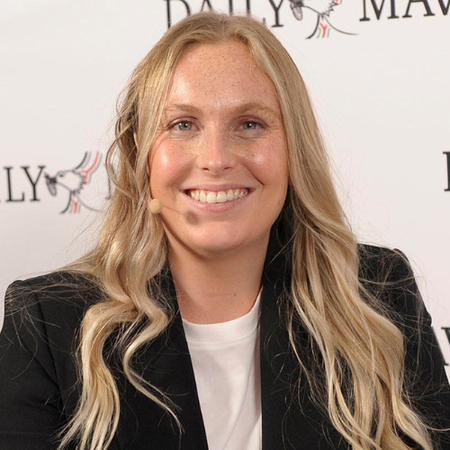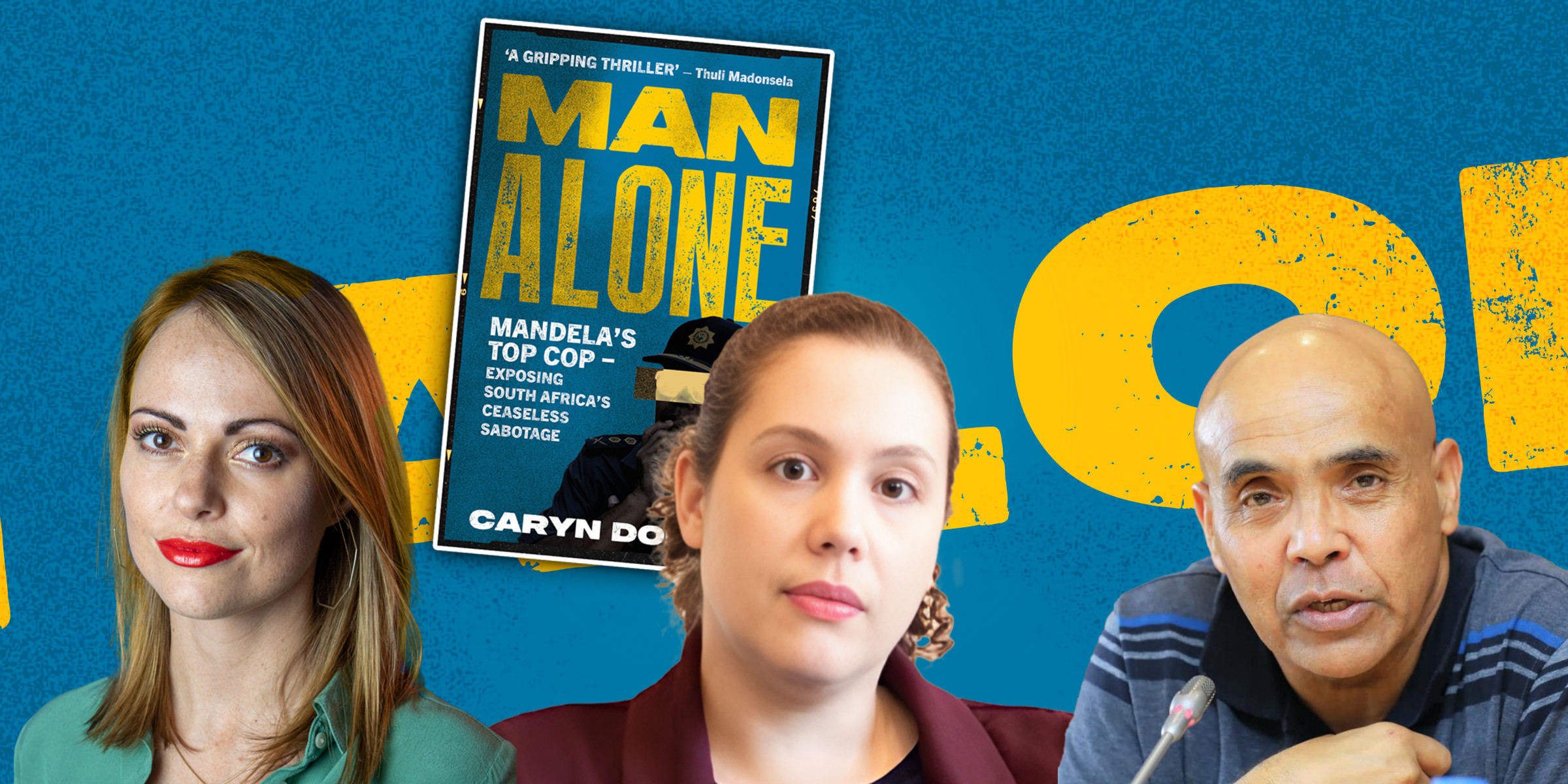“I’ve spent my whole career in the police fighting off these people… Nothing works for criminals without government collusion, and when you’re not part of that network, you are scorned, you are frowned upon… To keep fighting you really need to be strong,” says retired Anti-Gang Unit boss André Lincoln.
Lincoln was speaking at a Daily Maverick webinar on Thursday, 17 October 2024, for the launch of Daily Maverick journalist Caryn Dolley’s book Man Alone: Mandela’s Top Cop – Exposing South Africa’s Ceaseless Sabotage. The webinar was hosted by Daily Maverick investigative journalist Pauli van Wyk.
“I think being in the trenches and fighting from the inside is really not an easy job,” said Lincoln.
Lincoln retired from the South African Police Service (SAPS) in October 2021. In 1996, South Africa’s first democratically elected president, Nelson Mandela, had appointed him to head the Presidential Investigation Task Unit (Pitu), where he investigated state links to the underworld. He was also the commander of Lieutenant-Colonel Charl Kinnear, who also investigated state links to underworld crimes and who was assassinated in September 2020, in Cape Town.
The book chronicles the life of Lincoln, who was at the heart of apartheid-era sabotage and global criminal investigations as Mandela’s top cop. Dolley reveals the ongoing cop-gangster collusion rooted in apartheid-era policing structures, showing, in granular detail, how these networks and structures continue today.
Speaking in the webinar, Dolley said she felt everything she had reported on in her 18 years as a journalist had led to this book.
“This book is definitely the book that broke my heart in a terrible way,” she said.
‘Subtle’ and ‘sophisticated’ organised crime
“Ordinary people don’t see it (organised crime) because it’s sophisticated; because it only becomes loud and ugly when the restaurant owner refuses to pay. In most instances, people pay. If you were to go down Sea Point main road, or into town into Long Street or Kloof Street, all those restaurant or club owners contribute to organised crime regularly. Most of them, unwillingly, but they have no other option. And they have no other option because of the way organised crime works,” said Lincoln.
“Why you don’t see it is because it’s subtle, very sophisticated and it is a massive business.”
Organised crime is not only relegated to the Cape Flats, said Lincoln and Dolley.
“We perceive gangsterism to be this not-of-crime only happening, or confined to, the so-called Cape Flats,” Dolley said. “The more I look into things and the older I get, the more I realise there are no silos; there are no boundaries.”
Dolley referred specifically to the murder of international steroid smuggler Brian Wainstein, who was killed in his home in the Cape Town suburb of Constantia in August 2017.
Read more: Charges against murdered ‘Steroid King’ reveal a global web of crime cases
“What that court case shows or alleges is that that murder, in that leafy suburb of Cape Town, is directly linked to gangs that we would perceive to be so-called Cape Flats (gangs); that murder is also linked to international organised crime,” she said.
This one assassination showed the “web of criminality unfolding around it, also seeping back into the state”, said Dolley. “Everything is interconnected. A single shooting is, most likely, not just an isolated shooting.”
Washing money
“Organised crime deals with both illegitimate and legitimate business – the one backs the other all the time. But the big part of this illegal economy of organised crime, is the issues of drug smuggling, human trafficking, (and) gunrunning. Those are the main and the big issues that really make organised crime what it is,” said Lincoln.
“The point I’d like to make with regards to organised crime, is that it cannot operate or survive without the help of the state. So whether it is police, politicians, functionaries in different state departments – it’s like that in all our state departments – whether you look at the police, or home affairs or finance or foreign affairs – it is there.”
“Everything that happens, happens in the bigger picture of things,” Lincoln said, adding that gangs that often we write-off as “street skollies” are really the conduits for cartels in Colombia. (Drug links between South Africa and Colombia are detailed in Dolley’s previous book, Clash of the Cartels: Unmasking the global drug kingpins stalking South Africa.)
“A lot of the murders we see taking place here are based on who wants to be the main person of that cartel; who wants to be the biggest money-earner out of that. There we see how money is laundered,” he said.
Speaking about the drug cartels, Dolley added: “I also want to highlight as well that it’s not our crime and their crime – this is transnational crime, criminals are working together. There’s no xenophobia happening here.
“We’ve got gangs who will go out to sea and pick up drugs that are dropped off by a so-called international cartel – they’ll bring it in and it’ll get sold,” she said.
Lincoln said that when it came to money laundering, there were “sophisticated means of washing” money.
“It’s not like in the past where it was okay to deal with wads of cash. These days on the global network you need a bank account, you need a credit card, you need to be able to transfer and receive money – and this is where the networks have expanded,” he said.
Van Wyk further explained the process of washing money, saying cash was not recognised as a way to “legitimately do business these days”, and “what you would do with money laundering then is, from an illegal operation, to wash it through various means – like a cash-heavy business, like a restaurant or a betting site – to wash the money and hide the origin”.
Asked by Van Wyk whether he believed the introduction of a cashless society in South Africa would help combat organised crime, Lincoln said: “Yes, in a perfect society it is the measure that can help. But in a society like ours, in a society like in South America where lots of our drugs come from, a cashless society won’t necessarily work. There will always be cash. And I can tell you by the time we install a cashless society — let’s say in South Africa — organised crime will be way ahead of us and would know how to sabotage… that system.”
Solutions to the crisis
Both Lincoln and Dolley agreed that short-term solutions to the crisis were few and far between, but among them was the reimagining and reorganising of the SAPS.
We need to admit that the 30 years that we’ve been governed by the ANC have done us no good — it has fermented and bolstered criminality in many ways.
“I think we need to look at the state as a whole,” said Lincoln. “We need to admit that the 30 years that we’ve been governed by the ANC have done us no good – it has fermented and bolstered criminality in many ways.”
“If we are to look specifically at the police, we need to have a rethinking and a retraining of police. What we have now is what we inherited from apartheid. There is not a single progressive police commissioner in any province in this country,” Lincoln said.
He added: “All the people who get appointed into positions of power are people who are not worthy of it.”
Lincoln referred specifically to the recent promotion of SAPS Major-General Patrick Mbotho to the Directorate for Priority Crime Investigation (Hawks), despite being implicated in bullying a senior female colleague and allegedly meeting with underworld figures. Mbotho assumed the position from 1 October 2024, and has an annual salary of R2-million.
“We really do need to scour the police service, we need freshness and we need clean, honest officers,” added Dolley. “We really have to look at mindsets,” she said. DM
For shop order details of the book Man Alone, click here:





 Pauli van Wyk. (Photo: Supplied)| Caryn Dolley. (Photo: Supplied) | André Lincoln. (Photo: Supplied)
Pauli van Wyk. (Photo: Supplied)| Caryn Dolley. (Photo: Supplied) | André Lincoln. (Photo: Supplied)